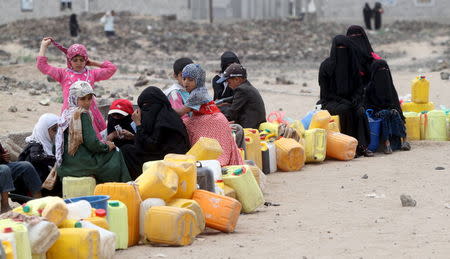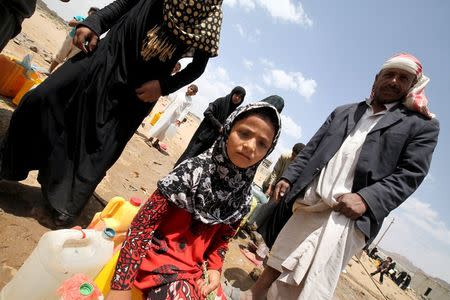Yemen humanitarian truce a lifeline for civilians: aid agencies
By Kieran Guilbert LONDON (Thomson Reuters Foundation) - A five-day humanitarian truce to allow fuel, medicine, food and aid workers to enter Yemen could be a "lifeline" for civilians trapped in conflict zones, aid agencies said on Wednesday. Yemen's dominant Houthi group accepted a ceasefire proposed by its adversary Saudi Arabia on Sunday, and it appeared to be broadly holding after more than six weeks of intense fighting. Backed by the United States, a Saudi-led coalition has been conducting air strikes against the Houthis and army units loyal to ex-president Ali Abdullah Saleh since March 26 with the aim of restoring the government of President Abd-Rabbu Mansour Hadi. The conflict has driven an already poor country toward a humanitarian disaster, wounding and killing hundreds of civilians, forcing hundreds of thousands to flee their homes, and exposing many more to disease and malnutrition. Fuel, medicine, food and surgical supplies for the wounded are the most urgent priorities for a country worryingly short of all these, the International Committee of the Red Cross (ICRC) said. "There has been no break whatsoever in the fighting until now, and the people of Yemen need a respite," said Sitara Jabeen, ICRC spokeswoman for the Middle East. "The local economy is crumbling and supplies need to be replenished... five days of peace would be a lifeline," Jabeen told the Thomson Reuters Foundation. The runway of Sanaa airport, bombed last month by the Saudi-led coalition, should be repaired urgently to allow large cargo planes carrying humanitarian staff and supplies to land in the capital, Jabeen added. The United Nations refugee agency (UNHCR) said it planned to deliver 300 tonnes of sleeping mats, blankets, and plastic sheeting to Yemen if the ceasefire was not violated. "While a humanitarian pause falls short of the peace so vitally needed in Yemen, it is nonetheless critically important that aid gets through, as existing stocks in country are becoming depleted, adding to the suffering of civilians," UNHCR spokesman Adrian Edwards said in a statement. Aid agency Oxfam said five days was not enough time to move supplies into and around the country. "It is still unclear how a temporary agreement will ensure the delivery of aid to the 12 million people without access to sufficient food, clean water, fuel or even basic medical care," said Grace Ommer, Oxfam's Yemen country director The conflict in Yemen has killed at least 600 people, wounded more than 2,000 and displaced some 300,000 since Houthi rebels allied with Iran seized the capital Sanaa in September, according to the United Nations, expelling the president. (Reporting By Kieran Guilbert; Editing by Tim Pearce)





